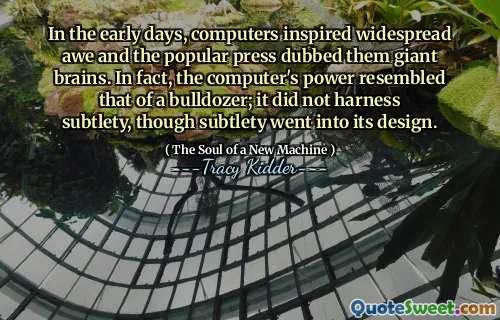
Computer Power and Human Reason이라는 책에서 MIT의 Computer Science 교수는 Joseph Weizenbaum이라는 이름을 썼습니다. 그는 컴퓨터 콘솔에서 전능성에 대한 거대 화상의 환상을 연주하는 종종 가라 앉고 빛나는 눈으로, 어리석은 외모의 밝은 젊은이로 괴로움을 묘사합니다. 그들은 자신의 기계에 앉아 팔을 긴장시키고 손가락을 발사하기 위해 기다리고, 이미 롤링 주사위에 도박꾼처럼주의를 기울인 버튼과 열쇠에서 이미 파업을 할 예정입니다.
(In a book called Computer Power and Human Reason, a professor of computer science at MIT named Joseph Weizenbaum writes of a malady he calls the compulsion to program. He describes the afflicted as bright young men of disheveled appearance, often with sunken, glowing eyes, who play out megalomaniacal fantasies of omnipotence at computer consoles; they sit at their machines, he writes, their arms tensed and waiting to fire their fingers, already poised to strike, at the buttons and keys on which their attention seems to be as riveted as a gambler's on the rolling dice.)
"컴퓨터 힘과 인간의 이유"에서 MIT의 교수 인 조셉 바이 젠 바움은 "프로그램의 강요"라는 용어를 묘사합니다. 그는이 상태에 시달리는 사람들을 화려하면서도 흐트러진 청년으로 묘사합니다. 이 개인들은 컴퓨터에 앉아있는 동안 웅장한 힘과 통제의 환상에 의해 소비되며, 당면한 과제에 집중했습니다.
. weizenbaum은 긴장된 물리적 입장을 보여주고 열쇠와 버튼에 참여할 준비가 된이 프로그래머들의 거의 중대한 행동을 강조합니다. 화면에 대한 그들의 고정은 롤링 주사위의 결과에 고정 된 도박꾼의 고정과 비슷하며 기술 및 프로그래밍에 대한 깊고 강박적인 참여를 강조합니다.











